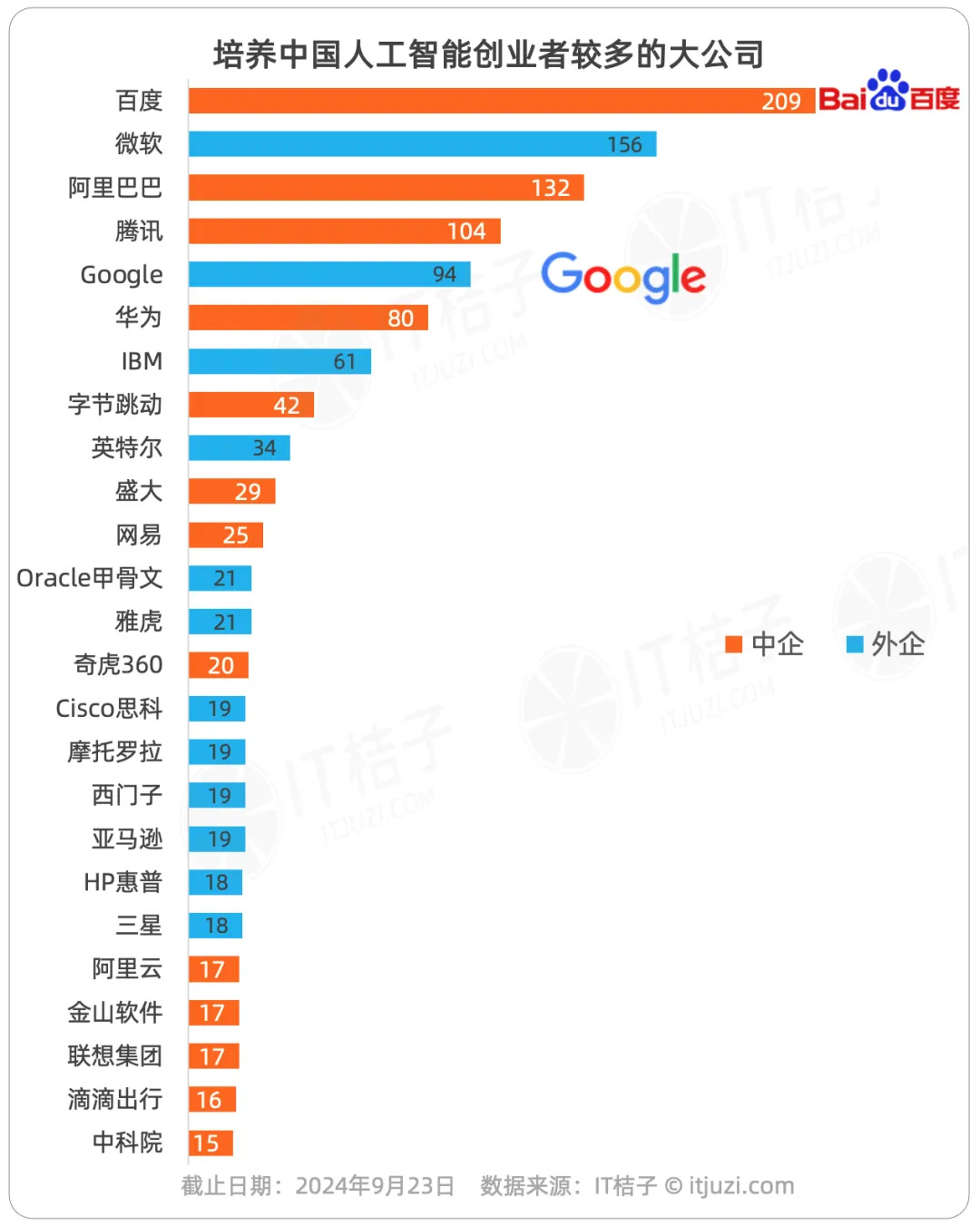Greetings from a world where…
deeper wells can be found
…As always, the searchable archive of all past issues is here. Please please subscribe here to support ChinAI under a Guardian/Wikipedia-style tipping model (everyone gets the same content but those who can pay support access for all AND compensation for awesome ChinAI contributors).
Feature Translation: Two of the five companies that “cultivate” the most Chinese AI entrepreneurs are foreign companies
Context: IT Juzi[IT桔子] has collected some cool data on the educational and employment backgrounds of Chinese AI entrepreneurs, scoped to those in founding teams or senior management positions. Among this group of about 6,500 entrepreneurs, IT Juzi has found biographical information on education for about 2,000 people and biographical information on employment for about 1,400 people. ***This means there’s an important caveat in the form of a selection bias for the data about to be presented: those who have publicly disclosed their academic qualifications and past employers are likely to have come from high-prestige institutions; whereas, those from less prestigious backgrounds tend to not publicize that information, so it is less likely to find its way into media reports (and the IT Juzi dataset).
Key Takeaways: Why is it important to understand the career trajectories of AI entrepreneurs?
The popular narrative of start-up founders is that they start their ventures during or right after college (think: Tsinghua University students starting the computer vision firm Megvii). In reality, less than 1% of Tsinghua graduates become entrepreneurs after graduation. The more common situation is that people join a company after graduation, accumulate experience, and then choose to start their own venture.
So, in the Chinese AI industry, which are the large/famous tech companies where people gain experience before they start their entrepreneurial path?
The IT Juzi data reveals some interesting trends (image below), including the prominence of foreign companies [外企] in the career resumes of Chinese AI entrepreneurs.
First, Baidu is the large tech company that has cultivated the most Chinese AI entrepreneurs. There are 209 AI entrepreneurs are from Baidu or have worked in Baidu.
Next, the article states: “It is worth noting that among the top five companies ranked by the professional background of AI entrepreneurs, foreign companies and multinational companies occupy two seats, which is different from the fact that the top five universities that cultivate the most AI entrepreneurs are all domestic universities (Tsinghua University, Peking University, Shanghai Jiaotong University, Zhejiang University, and University of the Chinese Academy of Sciences).”

In fact, 12 of the top 25 previous employers of Chinese AI entrepreneurs are foreign companies (in order from top down: Microsoft, Google, IBM, Intel, Oracle, Yahoo, Cisco, Motorola, Siemens, Amazon, HP, Samsung). The blue-shaded bars are foreign companies, while the orange-shaded bars are Chinese companies.
FULL TRANSLATION, including some details on the unique role of the Chinese Academy of Sciences: Who would have thought, two of the top five companies that “cultivate” the most Chinese AI entrepreneurs are foreign companies
ChinAI Links (Four to Forward)
Must-read: From Click to Boom — The Political Economy of E-Commerce in China
Lizhi Liu, assistant professor at Georgetown’s school of business, recently published her book on the development of the world’s largest e-commerce market. It builds on “built on extensive fieldwork across 6 provinces, hundreds of interviews, two original surveys, 27 million data of proprietary transactions, and a rare, large-scale field experiment spanning 3 Chinese provinces.” See her Twitter preview thread.
Should-read: Biden’s final meeting with Xi Jinping reaps agreement on AI and nukes
By Lauren Egan and Phelim Kine for Politico, this article details some of the outcomes of President Biden and Chinese leader Xi’s two-hour meeting during the APEC summit. One surprise agreement on AI: The two leaders agreed to avoid giving artificial intelligence control of nuclear weapons systems."
Should-read: From Laboratory to Hegemony?
Thanks to Robert Bellafiore, director of research at the Foundation for American Innovation, for a favorable review of my book Technology and the Rise of Great Powers in The Republic. It’s provides a sharp distillation of the book’s key takeaways.
Should-attend: Two book talks at Oxford
For those in and around Oxford, I’ll be back next week to give two book talks (and consume a lot of Sasi’s Thai).
November 25, Monday noon (UK time) at the China Centre. Professor Yeling Tan will give discussant remarks.
November 26, Tuesday noon (UK time) at the Oxford Martin School (co-sponsored by the Centre for the Governance of AI and the Oxford Martin AI Governance Initiative). Ben Garfinkel, Robert Trager, and Kayla Blomquist will provide comments.
Thank you for reading and engaging.
These are Jeff Ding's (sometimes) weekly translations of Chinese-language musings on AI and related topics. Jeff is an Assistant Professor of Political Science at George Washington University.
Check out the archive of all past issues here & please subscribe here to support ChinAI under a Guardian/Wikipedia-style tipping model (everyone gets the same content but those who can pay for a subscription will support access for all).
Also! Listen to narrations of the ChinAI Newsletter in podcast format here.
Any suggestions or feedback? Let me know at chinainewsletter@gmail.com or on Twitter at @jjding99


